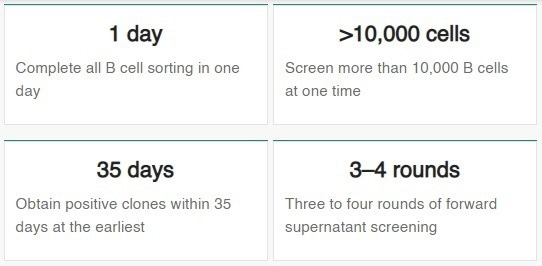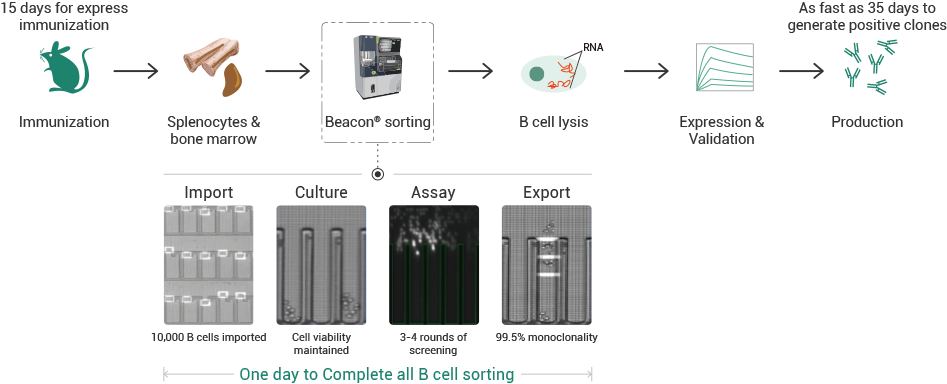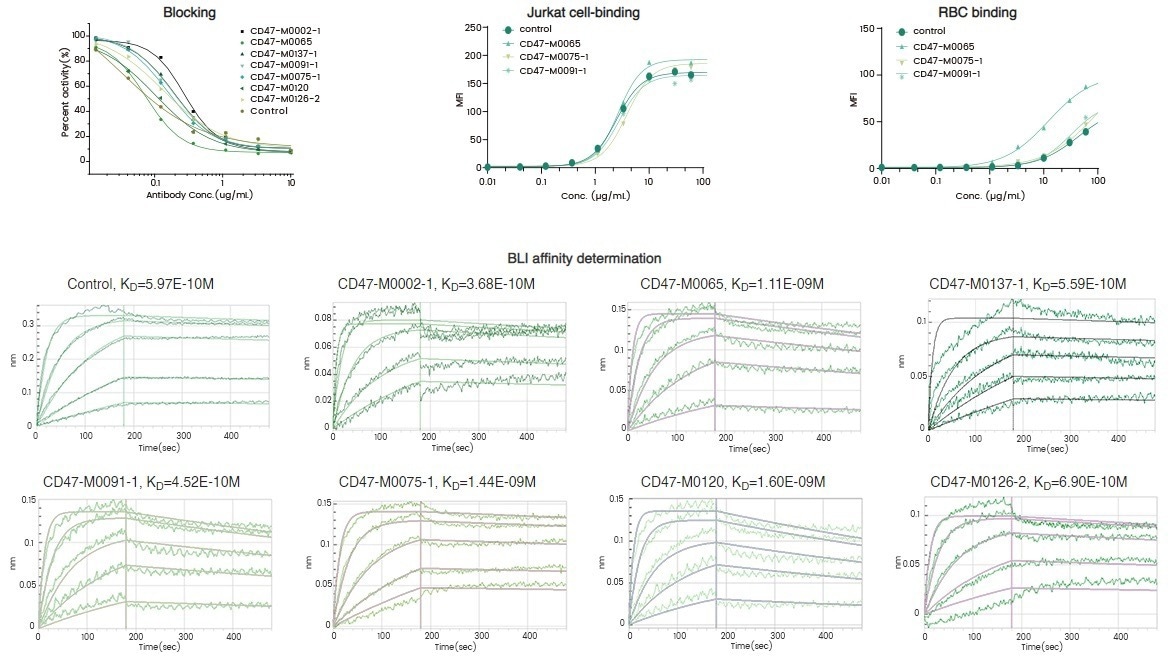Existing monoclonal antibody development technologies, such as hybridoma technology, suffer from a loss of diversity due to cell fusion efficiency, and phage display technology creates antibodies whose heavy and light chains are not naturally paired.
Therefore, traditional techniques are inefficient, and substantial time is required to develop antibodies.
The Beacon® single-cell optofluidic system combines a unique OptoElectronic Positioning (OEP) technology with novel microfluidic technology. It can precisely select single cells on a chip, carry out several single-cell assays, and export target cells based on particular outcomes.
The Beacon® optofluidic platform maintains the diversity of B cells, producing high-quality positive hits at an early discovery stage, and preventing "good clones" from being lost.

Image Credit: Sino Biological Inc.
The technical route of Beacon® single B cell antibody discovery
The Beacon® single B cell sorting platform automatically screens tens of thousands of plasma cells procured from immunized animals, reducing the monitoring process, which takes one to two months using conventional hybridoma technology, to just one day.
The monitoring process does not harm the cells, ensuring maximum cell viability. Employing rapid mouse immunization protocols, Sino Biological attains positive clones in as little as 35 days, thus quickening the process of antibody (drug) discovery. The company also offers mouse monoclonal antibody humanization services.
Following two rounds of 3D structural modeling, the final monoclonal antibodies achieve a degree of humanization that surpasses 95%.

Flowchart of Beacon® Single B Cell Cloning Platform. Image Credit: Sino Biological Inc.
Beacon® antibody development service packages
The below service packages are designed for therapeutic antibody development services.
Mouse single B cell Beacon® service
- Import tens of thousands of B cells at one time
- Three to four rounds of supernatant assays prior to construction
- Positive clones can be attained in 35 days at the earliest
- Rapid immunization within 15 days, standard immunization in 7–11 weeks
- Designed for therapeutic antibody development services
- Rapid immunization within 15 days, standard immunization in 7–11 weeks
- Positive clones can be attained in 35 days at the earliest
- Antigen-neutralizing and non-neutralizing anti-idiotype antibodies are available
- Functional assays with high-throughput specificity and antigen competition
Antibody drug development services
- One day to complete protein-based and cell-based assays
- Guaranteed highest antibody diversity
- High-throughput analysis, 14,000 B cells per chip
- One-stop services for antibody drug development, including evaluation, immunization, antigen design, engineering, screening, and stable cell line development
Case study of Beacon® CD47 candidate screening
CD47 is a common drug target, overexpressed in normal cells, such as red blood cells and cancer cells. Sino Biological has used the Beacon® single B cell platform to screen various CD47 antibodies that bind to protein and tumor cells.
In the blocking assay, CD47 antibodies successfully blocked the binding of CD47 to its ligand signal regulatory protein α (SIRPα). In the BLI affinity assay, the affinity levels of these antibodies were equivalent to those of a control antibody, reaching nanomolar or sub-nanomolar levels.
In the cell-binding assay, CD47 antibodies bound to tumor cells (Jurkat cells) but only weakly bound to CD47 on the surfaces of the red blood cells at high concentrations. These results were similar to those of the control antibody.

Image Credit: Sino Biological US Inc.
Beacon® screening platform FAQs
Is there a difference between cells sorted by Beacon® and flow cytometry?
Plasma cells at the end stage of B cell differentiation are organized using Beacon®, and memory B cells with antibodies expressed on the surface of their membranes are organized by flow cytometry.
What is the maximum number of B cells that can be imported into Beacon® at one time?
The Beacon® chips can be procured in various sizes. Between 7,000 to 20,000 B cells can be imported into a single chip, and cells can be imported into up to four chips at the same time.
What antibody screening reactions can be performed on the Beacon®?
The antibody screening assays that can be performed include multi-species cross-reactivity, ligand-receptor competition, IgG secretion, and reporter cell assays.
How does Beacon® enrich plasma cells?
Using plasma cell markers, plasma cells are enriched by magnetic beads and imported into the Beacon® system.
What species of plasma cells can be screened using the Beacon® screening system?
The Beacon® system is currently able to screen mouse and human plasma cells. The screening of rabbit plasma cells is currently under development.
What is the estimated survival time of plasma cells on the Beacon® platform, and are adequate antibodies secreted during this period for tests?
Plasma cells can remain viable on the instrument for one to two days. The plasma cells are introduced into the NanoPen, at 1 × 106 cells per ml, so the secreted antibodies are satisfactorily abundant for testing.
Why is flow cytometry suitable for sorting memory B cells and the Beacon® platform for plasma cells?
In flow cytometry, antibodies on the surfaces of B cells bind to particular antigens to produce fluorescence for sorting. Beacon® screens particular B cells by detecting antibodies discharged by plasma cells.
How does Sino Biological ensure that the exported cells are all single cells?
There is real-time video monitoring of the import and export processes to assess the rate of monoclonal antibodies imported to and exported from each well.
How many cells are usually exported at a single time?
The number of exported cells depends on the number of positive cells monitored. It is possible to export 2 × 96 B cells overnight.
More antibody discovery and expression platforms
Featured antibody development and production services